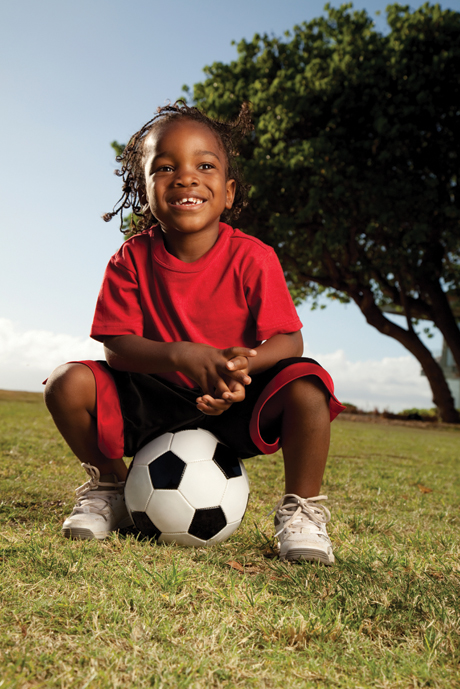 How many times have we heard this? “It’s not whether you win or lose, but how you play the game.”
How many times have we heard this? “It’s not whether you win or lose, but how you play the game.”
It’s advice that has been passed down through the generations. And for good reason: Experts agree that competition can be a “win” for kids — but only if parents, coaches and teachers handle it well.
“Adults are in control of the situation. If the environment is properly structured, competition can be a fun learning experience,” says Frank Smoll, Ph.D., psychology professor at the University of Washington and cofounder of YESports, which teaches positive approaches to youth athletics.
Kids face increasing demands to excel in all aspects of life — sports, academics, cultural arts. To make sure the competition is healthy, not harmful, adults need to stay present — and in the game.
Age-appropriate competition
Parents want to provide their children with a head start in life, but when it comes to competition, younger isn’t always better.
According to Smoll, a child’s comprehension of competition is linked to mental development. A 6-year-old typically has the cognitive abilities to begin benefiting from structured competition. Before that age, kids don’t fully understand competition, he says. That’s because competition involves working for goals that are far off in time. A youngster may enjoy the success of making a basket in the moment, but making enough to win at some point is harder to grasp.
Competition also requires an understanding of abstract values, such as how to strategize — a difficult concept for a small child, Smoll notes. In addition, youngsters have trouble understanding that rewards, a component of competition, might be obtainable. They are better able to understand more definitive cause-and-effect situations.
Smoll suggests younger kids stick with play — and don’t engage in structured competition until they’re around age 6.
Focus on process
Whether it’s in a soccer game or a spelling bee, an inherent goal of competing is winning. However, parents and coaches should take care not to make it the only goal.
“Focus on what’s going on during the process of competition: learning, improving skills, having fun, sportsmanship, teamwork,” says Smoll. “That’s not saying winning isn’t important, but that other things can be acquired, too. Kids can learn at an early age that you don’t have to win to be successful.”
Scott Jackman’s two sons, ages 9 and 6, participate in many activities — soccer, T-ball, swimming, golf and theater. The younger boy embraces competition, but initially found it difficult to deal with defeat.
“When he reacted negatively to a loss, I tried to reinforce the positive and point out things he may not have thought about, things that went well, like helping a teammate,” says Jackman, a Seattle resident.
Broadening the definition of success worked. Only a year later, Jackman’s son is a more confident soccer player and counsels overly competitive teammates on the benefits of good sportsmanship. “I overheard him tell another player that it’s not about who wins, but about having fun and trying your best,” says Jackman.
Emphasizing “fun” is crucial. Kids cite enjoyment as the number-one motivation for playing competitive sports. When they quit, it’s often because they don’t like the activity.
How can parents help make sure that fun factor is there?
“There should be parity between opposing sides,” says Chris Funk, associate director of True Competition, a national organization dedicated to educating and promoting ethical competition for kids. Younger kids, he says, can’t cope well when they are outmatched. “If you get too far outside your range of ability, you can no longer express your best potential, because the other side is so overpowering. The closer the ability levels, the more we play at the top end of our capabilities and learn something,” says Funk.
Don’t approach contests with a “battle” mentality, says Funk. “It’s easier to justify breaking rules when it’s your ‘enemy.’ You do things you would never do to a friend or partner — cheating, aggressive behavior, taunting, teasing. Help your children understand that the little boy or girl on the other side is just like them.”
And as a spectator, be respectful when you’re watching sports games at home — don’t berate the Super Bowl referee or gloat after a blowout win. The kids are watching you — they learn how to handle competition from the examples we set.
The value of play
Developing healthy attitudes about competition sets the foundation for adult life: college applications, job interviews and career advancement. But it’s also important to teach kids that not everything must be competitive.
“Some kids, and especially at younger ages, are sometimes better served with play. The true play experience, one that’s a cooperative approach, can be very positive,” says Funk.
Many regional YMCA youth programs are noncompetitive. Shoreline’s Dale Turner Family YMCA offers soccer, basketball, volleyball, swimming and other sports for preschoolers through high school. And most leagues don’t keep score. The focus is having fun, making friends and developing skills.
“Everyone plays an equal amount of time and tries new positions so they have a full, well-rounded experience,” says Kari Schmauch, Dale Turner’s director of youth development. “Kids feel it’s OK to try new things, because the lack of competition takes the pressure off.”
Julie Smith’s two boys, ages 4 and 7, participate in Dale Turner sports. She notes that her sons are always excited about practice. “Since it’s not super-competitive, they have time to really work on their skills. I think it’ll be helpful when they do eventually play high school sports,” says Smith.
Jackman says parents should encourage young children to experience new things without worrying about success or failure. “You have the rest of your life to audition and compete,” he says.
Deanna Duff is a Seattle-based freelance writer who contributes to a wide variety of regional and national publications. She is a member of the Society of Professional Journalists and the Washington Press Association.
HELPING KIDS COPE WITH COMPETITION
- Children mature at different levels. Before age 6, kids have difficulty understanding competition.
- Play is often a better option for preschoolers. Even if they seem to understand competitive situations, they often are merely emulating adult reactions in an attempt to please.
- You don’t have to win to be successful. In addition to the final score, reinforce other values of competition, such as skill development, good sportsmanship and teamwork.
- Keep it fun. Lack of fun is the No. 1 reason kids quit.
- For younger and older children, noncompetitive play has value. It allows children to explore and develop in a nonthreatening environment.
- Adults should play an active role in competitive extracurricular activities and not view them as baby-sitting. Be present and observe situations so you can provide insight and encouragement.
- For any competitive activity, make sure sides are equally matched. When one side is too dominant, it is unlikely kids will play to their full potential.
- Frame opponents as partners in the activity rather than “enemies.” Encouraging a war/battle mentality encourages children to devalue opponents and justify treating them poorly.
- Avoid motivating kids with bribes, for example, with “a pizza party if we win!” This focuses on the outcome rather than the process.
Sources: Frank Smoll, Ph.D., and Chris Funk











